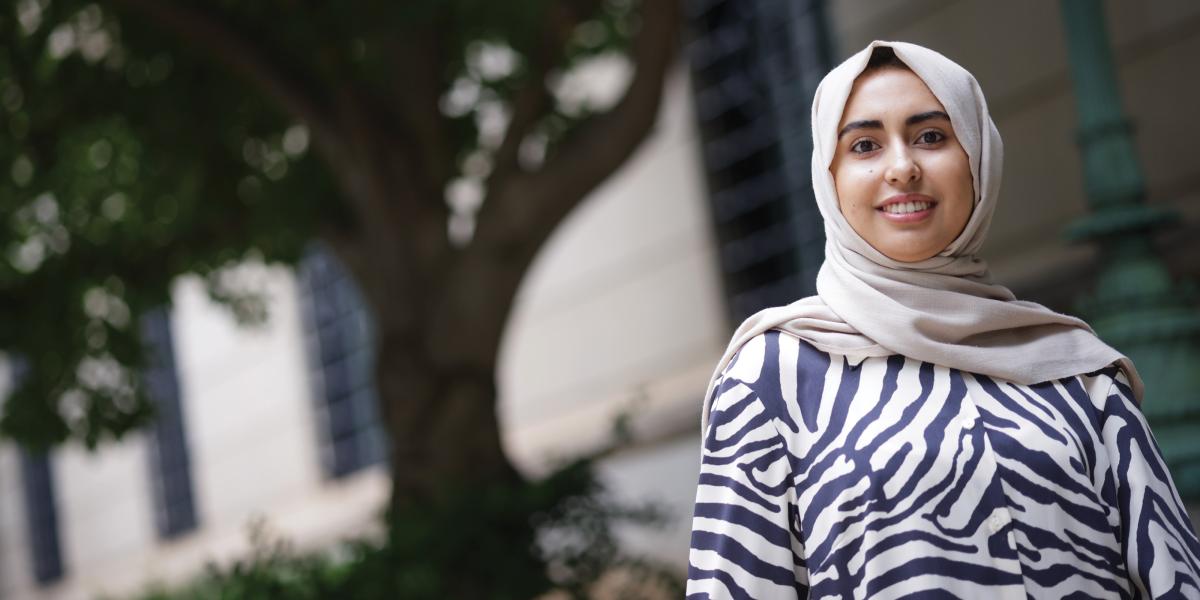A Hero’s Toolkit: Training in Nutrition and Humanitarian Disaster Response
An MPH student develops skills to one day take back to Afghanistan.
“I’m alive-dead.”
That’s what I told my boss when she called me on August 15, 2021.
The day had started normally. My colleagues and I at the UNICEF office in Kabul were about to visit a camp for internally displaced people who had fled fighting between the Taliban and Afghan government forces. We were going there to check in on how our nutrition program was working.
Suddenly, we all began receiving text messages. Kabul had fallen. The Taliban had taken the country. Rumors were flying.
Standing at my desk crying, I thought, “I'm in a black hole. There is nothing, no future for women—or for me.” When I got home, every one of my family members was hopeless. Three days later, I left home for the airport with my family.
I had come so far and worked so hard to get an important, challenging job in Kabul. Leaving felt like I was burying my hopes, my dreams.
My parents left Afghanistan in 1979 after the Soviet invasion. They lived in a refugee camp in Peshawar, Pakistan, for three decades. I say “camp,” but everyone had built a one- or two-room house. I was born there and so were my sisters and brothers.
After the U.S.-backed civilian government took power in 2002, we returned to Afghanistan, a home I had never known. I was 4 years old when we settled in a small rural village called Safid Sang in Logar province. We were starting a new life again from zero. When I was 5, I attended a school for girls. We met in a tent, and we sat on a carpet, but I was so excited to have new people in my life, to make friends and learn. I also benefited from a UNICEF/World Food Programme project. We got polio vaccinations, chewable deworming tablets, and vitamin A drops (whose lifesaving efficacy was proved by Dean Emeritus Alfred Sommer). They also gave us biscuits and milk every day—and cooking oil to take home. I now know I was in a school food program because malnutrition rates were so high in Afghanistan—and still are. Looking back, the UNICEF workers were true heroes. They worked tirelessly to break intergenerational cycles of malnutrition in my village. Thanks to them, I was healthy and could study.
Looking back, the UNICEF workers were true heroes. They worked tirelessly to break intergenerational cycles of malnutrition in my village.
After elementary school, there was no next step in education for girls in Safid Song. People in our village looked down on families who sought education for girls after puberty. So we moved to Kabul province. I call it a land of opportunity because I could go to middle and high school there. When I graduated from Kabul Medical University’s public health program, I took an unpaid internship in maternal and child nutrition in the Ministry of Health. At first, I helped coordinate meetings among the nutrition partners, but later I led efforts to improve maternal nutrition and build capacity among health care providers who would then train health workers at clinics.
I always love to learn from people who have different perspectives, so I was very happy that I landed a position with UNICEF and ultimately became a nutrition officer. When COVID-19 closed schools in Afghanistan, I was proud to be part of a team leading the Adolescent Anemia Program’s shift from schools to the community. We successfully piloted the program in three districts, and we were working to expand it to five provinces when the Taliban returned to power.
I arrived in the U.S. in September 2021 and spent a month in a military camp. Then I was settled in Georgia. I continued my UNICEF job doing remote work from 10 p.m. to 4 a.m. with my colleagues in Afghanistan, and then I took a job with the Georgia Department of Health translating and helping my fellow Afghans navigate the complex U.S. health system. The work was rewarding, but I knew I wanted to do more, to work in nutrition and humanitarian emergency response. Now an MPH student here at Johns Hopkins, I’m doing all that I can to prepare myself to make a difference when I one day can return to Afghanistan.
Nearly 14 million children in Afghanistan don’t have enough to eat, according to UNICEF.
They need a hero just like I did.
